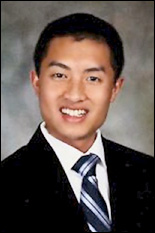News Story
Alumnus Recognized for Work with Teach for America

David Lai (B.S. '12, bioengineering)
Part of the first generation of his family to attend college, Lai decided to postpone graduate studies or a career in medical device design to join Teach for America, which works to eliminate inequities in the nation's public education system by providing schools in low-income communities with the teachers they need to provide an excellent education for all children.
BioE recently caught up with Lai to learn more about his experiences in the classroom.
BioE: How and why did you become involved with Teach for America?
Lai: I became involved with Teach for America because of a love for education and community service. In college, I continued volunteering with youth through Alpha Phi Omega National Service Fraternity. Volunteering with afterschool programs reaffirmed my interests in serving others through education.
Knowing about the competitive nature of the program, I did not think much about Teach for America after I applied [to] and investigated graduate programs. When the application returned successful, I figured that it was an opportunity I could not pass up.
BioE: What you enjoy most about teaching?
Lai: The most enjoyable aspect of teaching is seeing the students grow as people and as scholars. There is nothing like the look on a child's face when he or she is excited about learning. Additionally, I enjoy learning through teaching. Every now and then I notice details that I've forgotten from when I was in school. With the influx of educational technology, I've also found myself finding and learning how to incorporate these resources in class.
BioE: What has been most challenging about teaching?
Lai: The most challenging part of teaching is differentiating for diverse learners. Everyone has different learning styles and a teacher must explore strategies to maintain interest for all students. Investigating strategies for engagement occurs on top of lesson planning, grading, managing behavior, and communicating with parents. The job requires a great deal of time management and organization.
BioE: What has been most rewarding about teaching so far?
The most rewarding aspect of teaching is growing with the students. There is something to learn everyday. From the students, I hear perspectives with which I might not be as familiar, prompting me to further my research on [certain] topics. Beyond academics, it is also rewarding learn about backgrounds of the students and to see how varied life experiences can be even for young people.
BioE: What Clark School or Bioengineering experiences have influenced how or what you teach?
Lai: The largest influence the Clark School has on my teaching practice is demonstrating the importance of learning through inquiry…students must be able to take what they know and apply it to exploring new topics for themselves. Turning theory into practice is a necessary step in learning science. I can relate this to every engineering project that I had to do in college, in which knowledge was combined with creativity to [make] something new. Engineering proved essential for understanding the importance of STEM [Science, Math, Engineering and Mathematics] in teaching science. Modern science education requires more than just teaching science…I must incorporate technology, engineering, and math to ensure students are ready for modern industry.
To lean more about Teach For America, visit www.teachforamerica.org.
Published February 7, 2013









